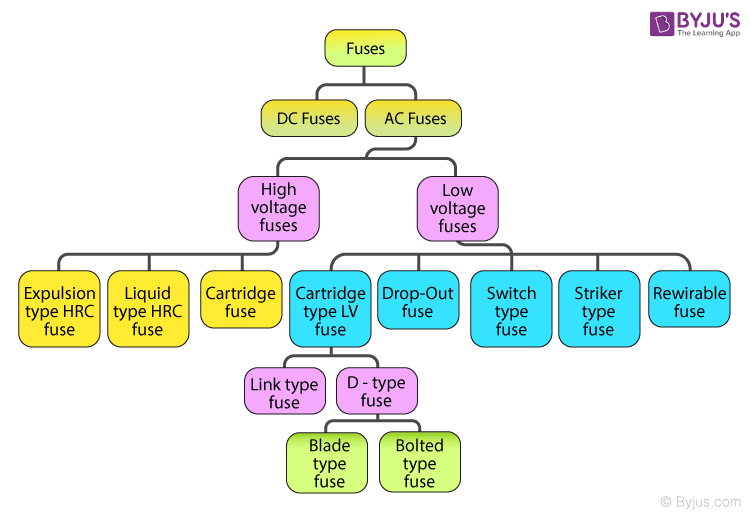Introduction
- An electrical fuse is a safety device that operates to provide protection against the overflow of current in an electrical circuit.
- An important component of an electrical fuse is a metal wire or strip that melts when excess current flows through it.
- It helps to protect the device by stopping or interrupting the current.
- In this article, let us know in detail about the Working Principle of the electrical fuse and its functions and types.
| Table of Contents: |

Working Principle of an Electrical Fuse
To understand the working principle behind an electrical fuse, two critical concepts should be kept in mind
- Current flows in a loop
- Heating effect of current
- Electric current can flow through a conductor only when the circuit formed is complete. If there is a break in the loop, electric charges cannot flow through.
- This is also how switches operate.
- For example, when you put on the light switches at home, the lights come on because you have just completed the circuit allowing charges from the power source to flow through and power your lights.
- When current passes through a conductor, the different electrical components of the circuit like the devices attached or even the wire itself, offer resistance to the current flow.
- The work done to overcome this resistance presents itself in the form of heat.
- This is a simple explanation of the “heating effect” of current.
Principle of Electrical Fuse
- The primary use of an electric fuse is to protect electrical equipment from excessive current and to prevent short circuits or mismatched loads.
- Electrical fuses play the role of miniature circuit breakers.
- Apart from protecting equipment, they are also used as safety measures to prevent any safety hazards to humans.
- The fuse wire in an electrical fuse is selected in such a way that it does not face any damage when the normally stipulated amount of current flows through the circuit.
- Under normal conditions, the fuse wire is a part of the circuitry, contributing to a complete loop for charges to flow through it.
- However, when an excessive amount of current flows through the fuse wire, the heating effect of the current causes the fuse wire to melt.
- This is because the fuse wire is chosen such that it has a low melting point.
- This causes the loop to break thereby stopping the flow of charges in the circuit.
- It is important to select a fuse that is properly specified for the circuit in consideration.
- For example, if the fuse that is used is underrated, then it will fail even under normal current conditions, unnecessarily breaking the circuit loop.
- If it is overrated, then it will not break the circuit when required and cause equipment damage and failure and may even present itself as a safety hazard.
ll not break the circuit when required and cause equipment damage and failure and may even present itself as a safety hazard.
Function of Fuse
In the field of electrical engineering, a fuse is a device that provides overcurrent protection to the functional electrical circuit. Here, we have listed a few major functions of the fuse.
- Acts as a barrier between the electric circuit and the human body
- Prevents device failure due to faulty circuit operation
- Fuse prevents short-circuits
- Prevents overload and blackouts
- Prevents damage that is caused due to mismatched loads
The markings on the fuse carry information such as the Ampere rating, voltage rating, and interruption rating.
Types of Fuses
Different types of fuses are available in the market, and they are classified on the basis of different aspects. But mainly, fuses can be divided into two categories based on the input supply as follows:
- AC fuses
- DC fuses
Given below is a flowchart of further classification of fuse:

You may want to watch the following video on how electricity flows through a circuit and understand what resists the flow of current.

Frequently Asked Questions-FAQs
What is an electrical fuse?
An electrical fuse is a safety device that operates to provide protection against the overflow of current in an electrical circuit.
What are the types of electrical fuse
Fuses are of two types:
- AC fuses
- DC fuses
State true or false: Electrical fuse acts as a barrier between the electric circuit and the human body.
The markings on the fuse carry which type of information?
List some functions of the fuse.
Watch the video and solve important questions in the chapter Electricity Class 10

Hope you have understood in detail the working principle of an electrical fuse along with the function and types of the fuse. Stay tuned with BYJU’S for more interesting information.

Comments